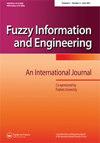不确定环境下模糊多目标总体生产计划问题的具有β偏度的综合可能性线性规划
IF 1.3
Q2 MATHEMATICS, APPLIED
引用次数: 2
摘要
提出了一种改进的模糊规划方法来求解不确定环境下的多目标综合生产计划问题。所提出的方法将可能性线性规划(PLP)的概念与β -偏度相结合,决策者可以操纵数据模糊的最佳水平,并在优化过程中保持这种模糊性(通过不过早地将其转向确定性数据)。通过一个案例研究,在不精确的运营成本、客户需求、劳动力水平和机器容量的情况下,最小化与理想总成本解决方案的最高总体偏差,证明了所提出方法的有效性。我们的比较结果清楚地表明,所得到的解优于传统的解模糊化方法。所提出的方法还可以帮助决策者不仅了解和优化最可能的情况,而且还可以实现乐观和悲观业务情况下的结果,以便决策者可以为未来的不确定性做好准备并采取必要的行动。本文章由计算机程序翻译,如有差异,请以英文原文为准。
Integrated Possibilistic Linear Programming with Beta-Skewness Degree for a Fuzzy Multi-Objective Aggregate Production Planning Problem Under Uncertain Environments
This study proposes an improved Fuzzy Programming (FP) approach to optimise multi-objective Aggregate Production Planning (APP) problem under uncertain environments. The proposed approach integrates the concept of Possibilistic Linear Programming (PLP) with Beta-Skewness Degree that decision-makers can manipulate the best level of data fuzziness as well as maintain such fuzziness in the optimisation process (by not turning it to deterministic data too early). The effectiveness of the proposed approach is demonstrated through a case study by minimising the highest overall deviation from the ideal solution of total costs under imprecise operating costs, customer demand, labour level, and machine capacity. Our comparative result clearly shows that the obtained solution outperforms the solutions from traditional defuzzification methods. The proposed approach also helps decision-makers not only to know and optimise the most likely situation, but also realise the outcomes in the optimistic and the pessimistic business situations so that decision makers can prepare and take necessary actions for future uncertainty.
求助全文
通过发布文献求助,成功后即可免费获取论文全文。
去求助
来源期刊

Fuzzy Information and Engineering
Mathematics-Logic
CiteScore
2.30
自引率
0.00%
发文量
13
审稿时长
40 weeks
期刊介绍:
Fuzzy Information and Engineering—An International Journal wants to provide a unified communication platform for researchers in a wide area of topics from pure and applied mathematics, computer science, engineering, and other related fields. While also accepting fundamental work, the journal focuses on applications. Research papers, short communications, and reviews are welcome. Technical topics within the scope include: (1) Fuzzy Information a. Fuzzy information theory and information systems b. Fuzzy clustering and classification c. Fuzzy information processing d. Hardware and software co-design e. Fuzzy computer f. Fuzzy database and data mining g. Fuzzy image processing and pattern recognition h. Fuzzy information granulation i. Knowledge acquisition and representation in fuzzy information (2) Fuzzy Sets and Systems a. Fuzzy sets b. Fuzzy analysis c. Fuzzy topology and fuzzy mapping d. Fuzzy equation e. Fuzzy programming and optimal f. Fuzzy probability and statistic g. Fuzzy logic and algebra h. General systems i. Fuzzy socioeconomic system j. Fuzzy decision support system k. Fuzzy expert system (3) Soft Computing a. Soft computing theory and foundation b. Nerve cell algorithms c. Genetic algorithms d. Fuzzy approximation algorithms e. Computing with words and Quantum computation (4) Fuzzy Engineering a. Fuzzy control b. Fuzzy system engineering c. Fuzzy knowledge engineering d. Fuzzy management engineering e. Fuzzy design f. Fuzzy industrial engineering g. Fuzzy system modeling (5) Fuzzy Operations Research [...] (6) Artificial Intelligence [...] (7) Others [...]
 求助内容:
求助内容: 应助结果提醒方式:
应助结果提醒方式:


